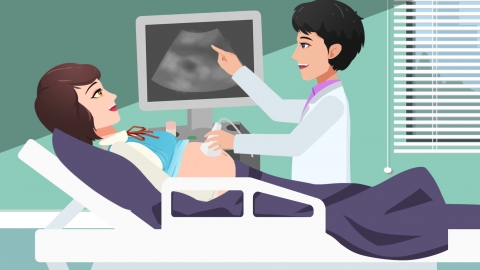What to do if the Down syndrome screening indicates a high risk for trisomy 21?
Generally, high-risk results for trisomy 21 in Down syndrome screening may be caused by factors such as advanced maternal age, incorrect calculation of gestational age, chromosomal abnormalities, exposure to teratogenic substances during pregnancy, and genetic factors. Pregnant women can visit a正规 hospital to choose further examinations or medical interventions to address these issues. Detailed explanations are as follows:
1. Advanced Maternal Age
When a pregnant woman is over 35 years old, the quality of her oocytes declines, increasing the likelihood of chromosomal segregation abnormalities, which may lead to a high-risk result in Down syndrome screening for trisomy 21. It is advisable to consult a doctor at the hospital promptly and, under medical guidance, choose procedures like amniocentesis or non-invasive DNA testing to determine the fetal chromosomal status. It is also important to maintain a calm mindset and avoid excessive anxiety.
2. Incorrect Calculation of Gestational Age
Inaccurate estimation of gestational age can affect the evaluation of screening results, potentially leading to a false-positive high-risk outcome. Bring early pregnancy ultrasound reports to the hospital, where the doctor can reassess the gestational age based on fetal development and reevaluate the screening results accordingly.

3. Chromosomal Abnormalities
If the fetus's chromosomes fail to separate properly during meiosis, resulting in an extra copy of chromosome 21, the Down syndrome screening will show a high-risk result. This is a common pathological cause. Amniocentesis is required to examine the fetal chromosomal karyotype for a definitive diagnosis. If trisomy 21 syndrome is confirmed, it is important to communicate thoroughly with the doctor and decide whether to continue the pregnancy based on the family's circumstances.
4. Exposure to Teratogenic Substances During Pregnancy
Long-term exposure to teratogenic substances such as chemicals and radiation during pregnancy may affect the stability of the fetal chromosomes, increasing the risk of trisomy 21 and resulting in a high-risk screening result. Immediately remove yourself from the teratogenic environment and avoid contact with pesticides, paint, radioactive substances, etc. At the same time, undergo regular prenatal checkups to monitor fetal development.
5. Genetic Factors
If either parent has genetic issues such as chromosomal balanced translocation, it may increase the likelihood of the fetus developing trisomy 21 syndrome, resulting in a high-risk screening result. Both parents should go to the hospital for chromosomal testing to determine whether any genetic abnormalities exist. Based on the test results, the doctor will assess the risk of fetal disease and provide professional reproductive advice.
In daily life, it is important to avoid exposure to harmful substances during pregnancy, maintain regular作息 and a balanced diet, stay in a good mental state, avoid excessive tension, and communicate test results with the doctor promptly.





